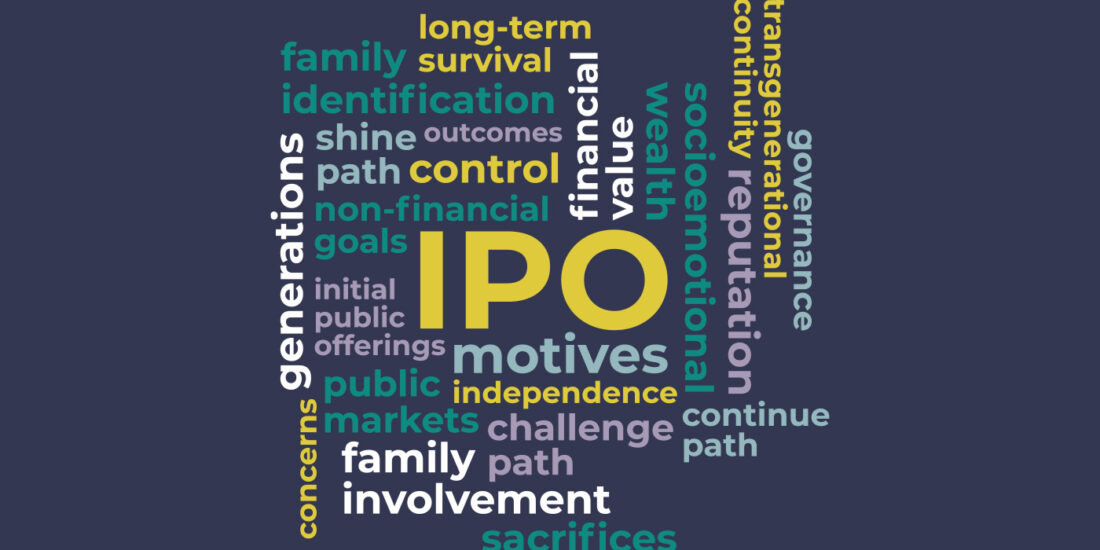Research Applied: FBR Précis for the Practitioner
This issue of The Practitioner begins a three week series of précis on the articles in the June issue of FBR. Please enjoy Professor John Ward’s précis on Dean Shephard’s thoughtful and forward-looking guest editorial on socioemotional wealth as it relates to the family enterprise, entrepreneurship as well as the researchers who study them.
(Author: Dean A. Shepherd)
Research Applied Précis Prepared by John L. Ward, Kellogg School of Management Northwestern University
Perhaps the most talked about and, recently, the most studied theory of family business is the theory of socioemotional wealth (SEW), the emotional – not economic – benefits of controlling a family business. The author of this essay, Professor Dean A. Shepherd, provides a unique and comprehensive look at where research in SEW stands today and where it might go, especially when one mixes both a family business and an entrepreneurial perspective, and what happens at the intersection of these two perspectives.
Emotions are, and have always been, the essence of family business. Perhaps most typically these emotions are discussed in the context of interpersonal conflicts. But this essay looks especially at the emotional benefits of being in business together. For example, families may deepen their commitment to their business and are motivated to make some personal sacrifices because they derive powerful meaning from being business owners. They take great pride in the creation and achievements of their business; they take great pride in the culture of their business; they deeply appreciate the means and motives of giving back; and they feel more fulfilled and connected by belonging to collective shared interests.
Professor Shepherd takes readers on a most thoughtful journey to explore much more. He posits that different people feel different levels of emotional benefit and for different reasons: that different firms provide different levels of emotional benefit and therefore perform differently. Most importantly, he dissects how the emotional benefits of the family firm affect the family’s interpersonal activities, and how the success or failure of entrepreneurial activities affect the business-owning family’s emotional benefits.
Because the emotional benefits of family business continuity are so important, business families are driven to add new ventures and new opportunities to add meaning to their maturing portfolio of legacy businesses. These “Enterprising Families” perpetually initiate and build new enterprises to assure the growth and perpetuation of the emotional benefits of continuity. These new ventures and opportunities can include family office resources and how the family’s liquid wealth is managed by family values and ethos.
For practitioners, Professor Shepherd brainstorms an insightful list of questions (which he calls conjectures) that will guide the practitioner (and researcher) in considering the many, many implications of SEW. But first, how do we practitioners engage in the theory of socioemotional wealth? When family business members are asked the question, “What is the purpose of the company or enterprise?” the answer is, inevitably, “To continue,” almost never to maximize shareholder economic value. That’s a testament to the importance of SEW. The next question is, “Why?” The common answers include: Keep the family together; make a difference for others; perpetuate a legacy; assure personal security and support; enhance reputation; and provide a sense of belonging.
To aspire to such a vision demands time and energy and also risks family conflict. Those expenditures must be outweighed by emotional benefits. Consequently, it’s often helpful to ask business families not only what are the emotional benefits of being in business together, but also, simply, “What’s the purpose of having a family?”
Similar questions are also raised differently by different practitioners. Professor Ivan Lansberg, for example, stresses the power of defining the family’s shared dream. Professor Annelie Karlsson emphasizes managing the family’s heirloom. In our governance courses at the Kellogg School of Management, we document how different levels of emotional benefits very much affect the design of a family’s governance system.
Some questions Professor Shepherd encourages practitioners and researchers to ask include, for example:
- What are the emotional benefits of the family business?
- How is the level and makeup of the emotional benefits different for different firms and for different members of the system?
- How can a family grow its emotional benefits?
- How do the nature and level of emotional benefits affect the entrepreneurial activity of the family?
- How does that affect the success of the entrepreneurial activity?
- How does the nature and success of the entrepreneurial activity affect the family’s level of emotional benefits?
- Are there different business strategies that more or less enhance the family’s emotional benefits?
- Does great variation of emotional benefits among members create more or less business opportunities? Or more and/or less emotional conflict?
These are but a few of the questions Professor Shepherd poses. He also provides examples of two situations where there may be conflict among family members (and/or non-family executives) in how they derive emotional benefits. To come full circle, these different sources of emotional benefits may well spark conflict among or between different constituents. If so, the growth of more profound emotional benefits will provide the motivation and the courage to confront the conflict.
Hopefully, researchers and practitioners will continue to probe the intersection of family business and entrepreneurship. The growth and refinement of SEW will greatly strengthen the practitioner’s and researcher’s understanding of families in business and families engaged in entrepreneurial progress.
About the contributor
 John L. Ward is clinical professor of family enterprise and co-director of the Center for Family Enterprises at Northwestern University’s Kellogg School of Management. An FFI Fellow, John is also a founding member of FFI and the recipient of the Richard Beckhard Award. He can be reached at johnward@kellogg.northwestern.edu.
John L. Ward is clinical professor of family enterprise and co-director of the Center for Family Enterprises at Northwestern University’s Kellogg School of Management. An FFI Fellow, John is also a founding member of FFI and the recipient of the Richard Beckhard Award. He can be reached at johnward@kellogg.northwestern.edu.




